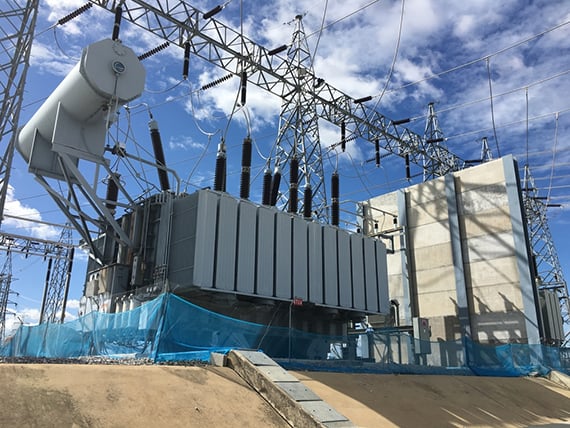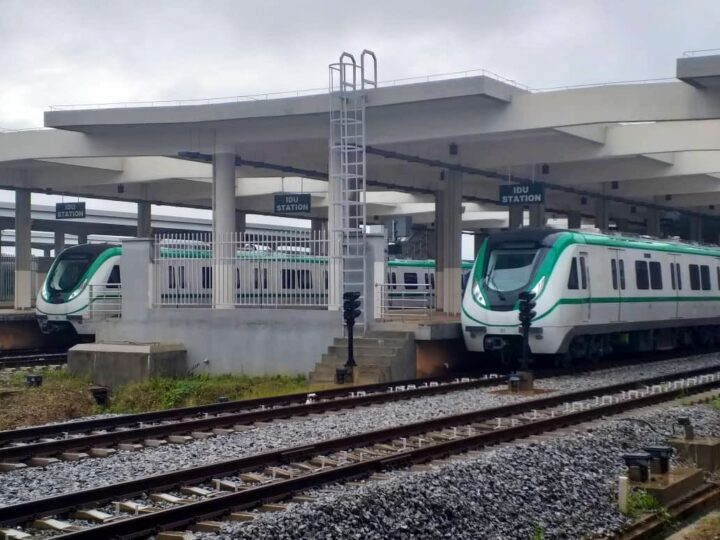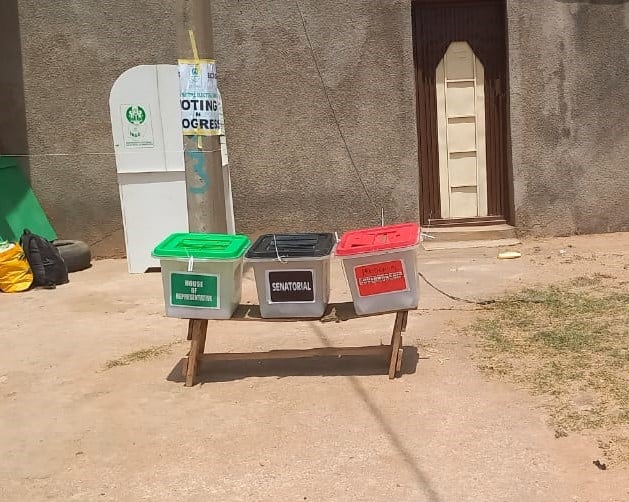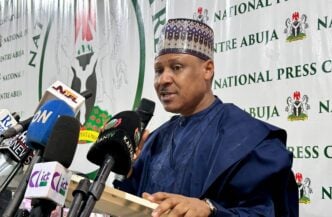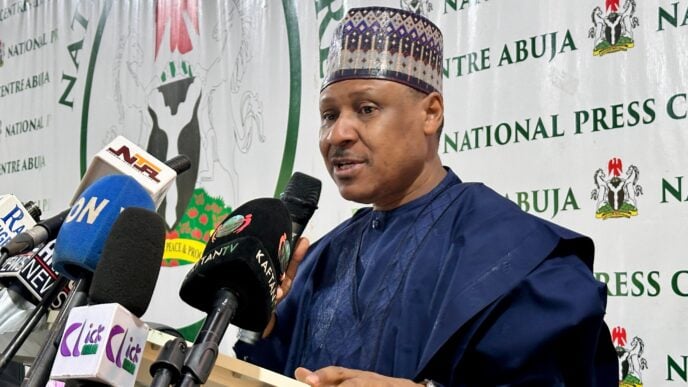And God said, “Let there be light,” and there was light. So, why exactly is Nigeria not listening to God?
A country where the lights once stayed on now finds itself trapped in perpetual darkness. Nigeria’s electricity crisis is more than a mere inconvenience; it is a profound systemic failure with devastating economic, social, and human costs. It is a tragedy of foresight—a nation that once took for granted a reliable power supply now lives with a crippling, self-inflicted wound. This is the story of how Nigeria lost the light and the desperate race to reclaim it.
The lack of consistent electricity has plunged Nigeria into a vicious cycle of darkness, poverty and underdevelopment. At its core, the problem is straightforward: unreliable power increases cost and reduces productivity. Businesses, from large manufacturers to the smallest tailors, are forced to rely on expensive and inefficient alternatives, such as diesel generators. This added expense eats into profits, making Nigerian goods uncompetitive and stifling growth. As businesses struggle, they are unable to grow, lay off workers or shut down entirely, leading to rising unemployment. This, in turn, reduces the purchasing power of the population and shrinks the overall economy. The shrinking economy means less tax revenue for the government, leaving it unable to fund essential infrastructure upgrades, including repairs to the very power grid that started the whole problem.
This self-perpetuating loop makes it incredibly difficult to break free from the cycle. Nigeria’s media has long framed the electricity crisis not just as a technical failure but as a moral and societal one. From public protests to heartbreaking tragedies, the media consistently highlights how the lack of power fuels social unrest and threatens public health.
Advertisement
The media frequently reports on community-led protests against the Distribution Companies (DisCos). Outlets like The Cable, Vanguard, and The Punch have documented countless instances of frustrated residents blocking roads and burning tires to protest “crazy bills” for electricity they never received. This public fury is a clear sign that the social contract between the state and its citizens has broken down.
Another key driver of this unrest is the “estimated billing” system. Investigative reports from media houses like Premium Times and Daily Trust have exposed this practice as “extortionate,” with DisCos issuing arbitrary bills to unmetered consumers that have no relation to actual consumption. This system has eroded public trust, discouraged legal payments, and fostered a culture of non-compliance, creating a direct tax on citizens for a service they do not receive.
The power crisis has tragic consequences for Nigeria’s healthcare sector, a reality heartbreakingly captured by the media. Reports have surfaced of patients dying because life-support machines and incubators fail during blackouts. A particularly shocking story from The Guardian Nigeria recounted surgeons using their mobile phone flashlights to complete an operation after a power failure. These reports underscore that the lack of electricity is a direct driver of high mortality rates and a key reason why medical professionals are leaving the country.
Advertisement
A community’s lifeline—its transformer—can fail, plunging residents into darkness. In a staggering betrayal of the social contract, it falls to the very people most burdened by hardship to pool their meagre resources and bribe the officials whose job it is to fix the problem. The failure to replace a critical piece of infrastructure, which should be a matter of days, instead stretches on for weeks, months, or even years. This unimaginable suffering is not a hypothetical scenario; it is the lived reality for countless Nigerians. With effective regulation, such an outrage would be impossible. When these so-called transformer failures inevitably occur, there should be robust enforcement mechanisms to ensure every household receives compensation for the untold hardship they endure from this forced deprivation. Electricity regulation is a major embarrassment for the government, I would be bold to say. It is like we do not have any regulatory agency, or the agency has become so incompetent that it has lost the sense of what it was established for and why.
The Unfolding Economic Disaster
The high cost of self-generated electricity is the single greatest barrier to Nigeria’s economic growth. Media outlets like BusinessDay have consistently published analyses showing how the power deficit is stifling job creation and actively destroying national wealth. Examples are cited of manufacturing companies relocating to countries like Ghana, where a stable power supply is a given, especially for the industrial sector. This industrial relocation has resulted in job losses and increased Nigeria’s reliance on importing some goods that we hitherto produced locally.
The crisis has also pushed the economy toward “informalisation.” Without stable, formal jobs, many people are forced into low-productivity, insecure work. A graphic designer who can only work when a generator is on represents a loss of potential for both themselves and the nation. In a world where wealth is increasingly created in the digital economy, this persistent darkness stunts innovation. It fuels a significant “brain drain” as talented young Nigerians leave the country for environments where their skills can thrive.
Advertisement
Ultimately, billions of dollars are spent annually on importing generators and fuel, money that could have been invested in the local economy. This capital flight not only drains the nation’s foreign reserves but also transfers wealth to other countries. The generator economy is a devastatingly costly, inefficient, and dangerous parallel energy system—a tragic paradox that highlights both the resilience of Nigerians and the profound failure of their government.
A Nostalgic Look at the Past
In Nigeria, a single question haunts every conversation about progress and development: “Where did the light go?” If you grew up in Lagos or any Nigerian city in the 1960s, ’70s, or early ’80s, you would be a living witness to a past where constant electricity was taken for granted. This is not a nostalgic fantasy; it is a profound and tragic reality that tells the story of a nation that failed to plan for its future.
There was a time when a power outage in a major city was a rarity, not a daily occurrence. The journey from that reliable past to the current state of perpetual darkness is a direct result of a fundamental failure in national foresight. Nigeria has a national habit of solving today’s problems with no thought for tomorrow. Past military regimes, in particular, neglected to maintain and enhance the critical power infrastructure they inherited. They did not anticipate a future where the population would double, and electricity demand would skyrocket. This lack of planning and a refusal to invest in foundational infrastructure is the single greatest cause of our current predicament.
Advertisement
The Path Forward: Learning from Our Peers
Nigeria’s electricity crisis is not unique, and a comparative analysis of peer nations offers clear solutions. The problem is not a lack of resources but a failure of leadership and implementation. Let us consider South Africa, Ghana and Kenya as examples.
Advertisement
There is the cautionary tale of South Africa. South Africa, once hailed as having Africa’s most reliable electricity system, is now a cautionary tale. The state-owned utility, Eskom, is crippled by an ageing infrastructure, massive debt, and corruption. The country’s power woes are a result of a catastrophic failure in maintenance and long-term planning, showing that even a well-built system can collapse under the weight of political indecision and mismanagement. This is a stark warning for Nigeria: the power crisis is not just a technical problem; it is a political and managerial one.
There is also Ghana’s pragmatic approach. Ghana faced a severe power crisis from 2012–2016 but took decisive action. It secured power from independent producers and established a more stable payment system, making the sector attractive to investors. Ghana also diversified its energy mix by leveraging its domestic gas supply alongside hydropower. The country’s more realistic tariff structure, which better reflects the cost of production, has been key to the sector’s financial viability. Ghana’s approach highlights the importance of pragmatic solutions and creating a bankable environment for investors.
Advertisement
Kenya’s leapfrog with renewables. Kenya made remarkable progress by strategically leveraging its natural resources. The country made a long-term commitment to tapping its vast geothermal resources, which now provide a stable, cheap, and renewable power source. Kenya has also rapidly increased its electrification rate through state-led initiatives, becoming a global leader in off-grid solar solutions. The country’s success demonstrates the power of embracing a diversified energy strategy and promoting innovative decentralised solutions.
A Glimmer of Hope: The New Plans
Advertisement
Nigeria’s government has introduced several ambitious initiatives to fix its electricity crisis, but a significant gap remains between promise and execution.
The Buhari administration’s Presidential Power Initiative (PPI) is a strategic partnership with Siemens AG to rebuild Nigeria’s entire power value chain. It brings world-class technical expertise to upgrade the nation’s ageing grid and is funded by a long-term, low-risk loan. However, progress has been disappointingly slow due to bureaucratic delays and a lack of consistent political will. The project’s success is also tied to the operational efficiency of the DisCos, which have historically struggled with revenue collection.
Recognising that the national grid cannot solve everyone’s problems, the government also launched the Solar Power Naija initiative, a promising off-grid solution. This programme aims to provide solar home systems to five million households, targeting underserved communities. It is a pragmatic step toward addressing energy poverty and stimulating the local economy. However, its rollout has faced significant hurdles, and the cost remains a barrier for many in extreme poverty.
Then, the Electricity Act 2023 has been a fundamental shift, another Buhari legacy. This is arguably the most transformative and promising piece of legislation, the Electricity Act 2023. This law fundamentally restructures the power sector by decentralising authority and allowing state governments to generate, transmit, and distribute electricity within their borders. This is a game-changer, as it unlocks sub-national competition and empowers states with resources and ambition to build their own systems, tailored to their specific needs. For example, a northern state could focus on solar, while a southern state could leverage its gas resources. While the Act holds immense long-term potential, its success will be uneven. States with limited resources may lag, and a lack of coordination could lead to chaos. Nonetheless, it represents the most significant step toward moving the sector away from a single, centralised failure point. Wealthier states like Lagos, Delta, Rivers and Ogun could achieve stable, uninterrupted electricity if they prioritise this infrastructure. States may also learn to work together and collaborate rather than alone.
Ultimately, Nigeria’s power crisis is not a technical riddle; it is a failure of governance and long-term strategic implementation. The solutions are clear and have been proven in other nations, but they require a fundamental shift in governance and strategy. There can be no greater privilege than the opportunity to lead a nation in desperate need of repair. For former presidents Obasanjo, Jonathan, and Buhari, this privilege came with an indescribable advantage: six to eight years to fundamentally fix the electricity sector. Their failure to do so is an unmitigated disaster—a legacy of incompetence for which there are no excuses. That the collective 22-24 years did not lead to progress in electricity is difficult to fathom. One of them, in a display of breathtaking audacity, has even had the temerity to blame his successors for incompetence on all fronts. Yet, he left the electricity situation worse than he met it after budgeting billions of dollars to improve it during his tenure. President Bola Tinubu now inherits this systemic failure. With two years remaining in his current term—or a potential six if re-elected—the stakes are higher than ever. Should he leave office with the power crisis unresolved, his failure will not merely echo those of his predecessors; it will resound with a shame that is more than double theirs, cementing a legacy of profound disappointment.
To break its cycle of power woes, Nigeria must prioritise political will and consistency, ensuring a sustained, multi-decade commitment to reform. It must ensure financial sustainability by adopting cost-reflective tariffs to attract the private investment needed for maintenance and expansion. The nation must also leverage its natural advantages, such as its vast gas and solar potential. Finally, Nigeria must embrace pragmatism, welcoming off-grid and decentralised solutions instead of remaining overly focused on a single, broken national grid.
Solving the power problem is not just one step toward economic prosperity; it is arguably the most critical prerequisite for unlocking Nigeria’s immense potential for employment and wealth creation. A permanent “Up NEPA” is possible. The urgency, nay desperation, to get it on course must be what keeps political leaders sleepless at night. The Nigerian people have had enough of plans; they now demand light.
Gbadamosi can be reached at [email protected]
Views expressed by contributors are strictly personal and not of TheCable.

